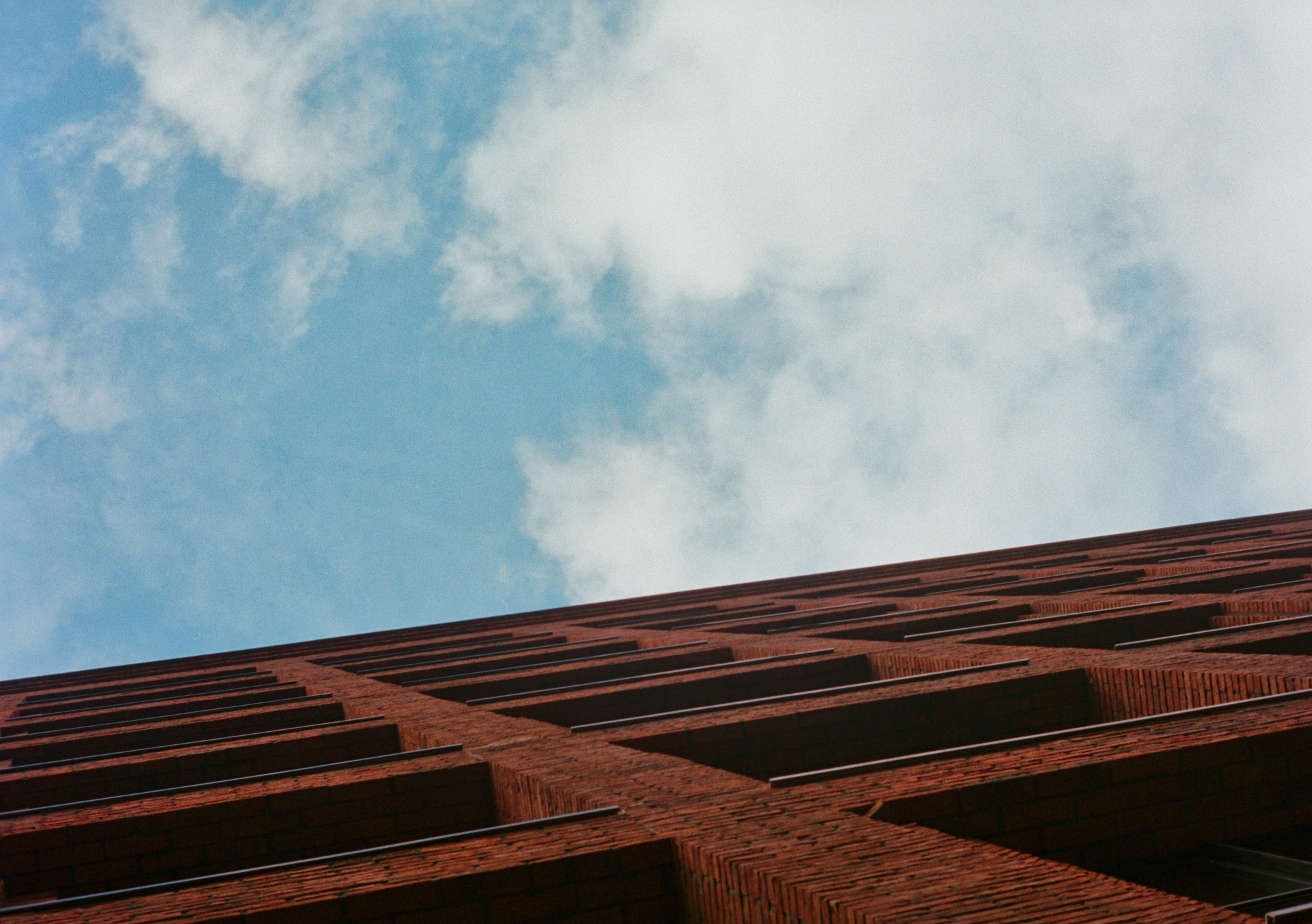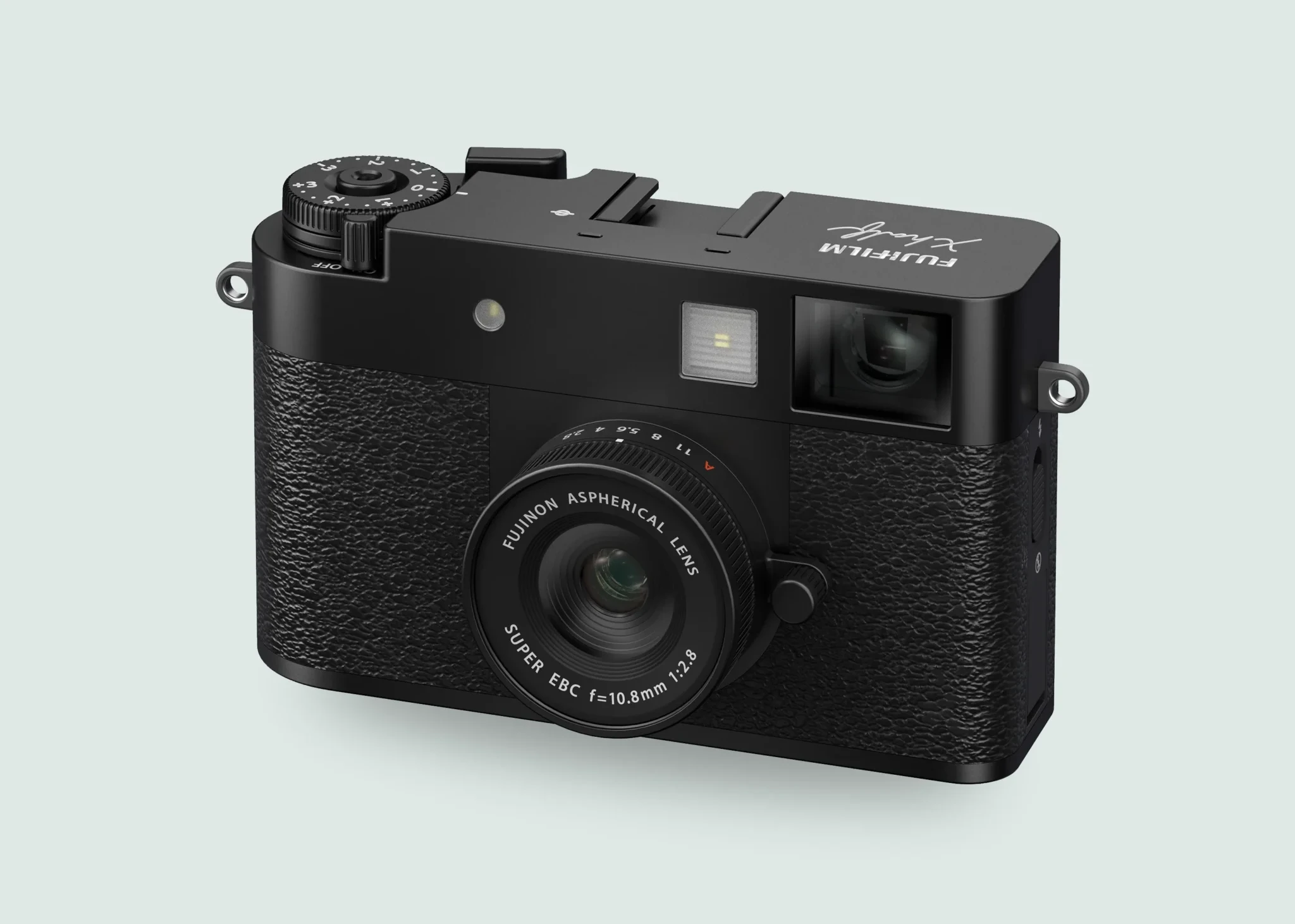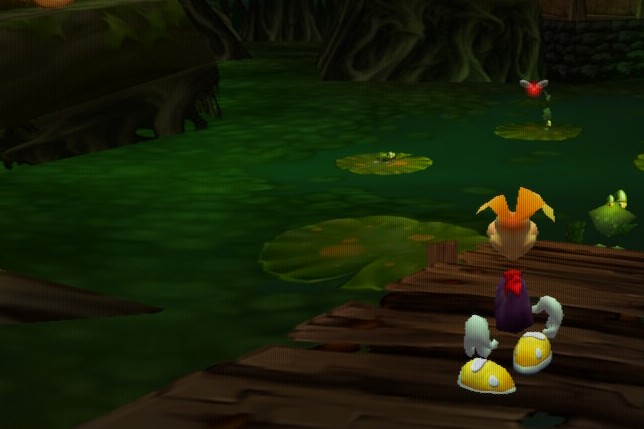chemical release
The Fuji X Half is a really weird camera. The "half" in its name derives from "half-frame", a style of 35mm film camera that prioritises economy over resolution. Because of the way a traditional 35mm film camera winds, you typically expose a 3:2 image in landscape orientation (I don't have the organs to spare to buy a Hasselblad XPAN), and therefore achieve an average of 36 exposures per standard cassette. Like a lot of other film photography weirdos, I appreciate that this helps me slow down and consider my shots. Unfortunately, part of the reason this has to be so meditative is film is fucking expensive. Lomography reports that their users photographs are getting less colourful and saturated year on year, in no small part because cheap-ish black and white film still exists. But then there's development costs, with most labs charging more to develop B&W due to it being more of manual process, so at best you're paying around £15 for 36 photos. It's definitely more economical to develop at home, though here you're subject to Sam Vime's boots theory , it only becomes cheaper to develop at home once you have bought all the necessary equipment, not just for developing but for scanning. As someone-or-other once said:
film photography is a constant oscillation between “waow the magic of light and chemistry” and “christ why is it doing this now this is a shit hobby for wankers" cathode ray tubetop, 2025
This is all to say, I understand why Fujifilm's X-series of cameras are popular, given that a) they don't look like a weird melted blob like professional digital cameras and b) they include "film simulations", allowing you to choose digital facsimiles of Kodak, Ilford and the Fujifilm they no longer sell. And the X Half is cute! It reminds me a little of my Olympus Pen-D, a half-frame film camera that's over sixty years old, but thanks to its metal construction and zero electronics it continues to work like a charm. I bought it because well, its cute, but it also gets around the boots theory- half frame cameras don't have as many absurdly hyped/priced models, and they also get 72 shots out of a 36 exposure roll. Half-frame cameras fell out of popularity back when economics no longer made sense, a professional was never going to enjoy the loss of resolution, and the standard consumer was better served by disposables, point and shoots and early digital. Now, though? People primarily share their film photos as scans on social media, so neither the resolution nor orientation poses much issue, and film sure isn't getting cheaper any time soon.
 |
|---|
| A photo I took on the Olympus Pen-D using Portra 150 film |
Or indeed, you could fake it. The Fuji X-Half doesn't just have film simulations, it can simulate being locked into a roll, barring you from changing the filter until you've gone through a set number of shots, and then only letting you see those photos when you've "developed" them on the app. All a bit silly really, but harmless enough. We're in the age of fixing social media addiction by buying more products sold on social media, and it's certainly a canny move by Fuji to make something so laser focused at that niche. A weird little experimental toy.

That costs £699.
This is where it all loses me. Sure, I may well have spent that on film by now, but I also have four cameras/brain problems. It's unfair to compare used prices to new, sure, but even the wince inducing RRP of the Pentax-17 is cheaper, despite all its usually-only-found-in-digital-and-arguably-necessary features. You could also get the supposedly decent Kodak Ektar for even less, and I really cannot overstate how many beautiful vintage half-frames exist with the exact same design language that Fuji is emulating. Yes, film is a bit of a faff, but it seems odd to prioritise convenience in hobbies, the thing we do to have fun. Through chatting at camera shops and film labs, going on group photo-walks and having strangers simply ask about whatever certified old as shit camera I'm holding; I've made so many connections in what has been atomised, isolated time. It's helped me slowly reconnect with a country I once thought of as home, and even if that never fully pans out, I wouldn't want to exchange that for a facsimile.
That's about how I've stood on these cameras since they've gained prominence, but there remains a nagging thought. Is my issue with these things one of authenticity? That's not a concept I'm a huge fan of, especially in art. When my film is scanned, the technician takes control of how they will look, so I almost always will make further changes in Darktable. Is that less authentic? Why wince at a filtered photograph going for a similar look? I've tried to keep myself in check as Gen Z starts putting my childhood in a blender- their takes on frutiger aero and PS1 graphics are about as authentic as my website is to Geocities, which is to say, who cares. I'm not immune to filters, either- despite owning a CRT I still use CRT shaders if the options go beyond mere scanline (big fan of shaders available in the latest Gradius collection!), since while I do feel phosphor-glow works better for pre-HD videogames, I don't consider my cheap Panasonic box the arbiter of what they should look like. Options that would never have previously been available are fun too- I'm currently playing Rayman 2 via a Dreamcast emulator on my Switch, far beyond the internal resolution of the system and with a pretty basic shadowmask shader. Is it an authentic representation? No. Does it look cool? I think so!

And yet there's still lines I don't like crossing. A certain anime YouTuber putting a hideous CRT filter over widescreen Simpsons footage sent shivers down my spine, and as I mentioned in the Delta post, I don't like the gamer fascination with trying to fix old games, as if the limitations that made them were somehow unimportant. And yes, to get back on topic, film simulations still rankle, even outside of the overpriced cameras. I've been testing out Mood, a freemium camera app that offers similar facsimiles to the Fuji system, and its… fine? My iPhone is getting on in years, and I've never been a fan of its camera processing- having to futz with other apps is what drove me to both the simplicity and control of analogue photography. Mood's photos definitely look nicer to my eyes, so that counts for something. It is arguably more interesting in its non-paid form, since that locks you into the random filter option. Unable to see what filter you're using and having to check the camera roll later does at least capture a sliver of the trepidation I have opening a folder of scans. Really all I outright dislike about the app is it describing ISO as quality, but regardless, a photo:

Ehhh? Not a brilliant composition I admit, I took it on my phone because I didn't want to waste film on it. But it has helped crystallise why these filters feel so off to me. For better and worse, it's still a digital photograph. I can't tell if its convincingly film-like, because I took it on my phone, and it was as vaguely "fine" a process as taking any other image on there. I will always know that my phones HDR kicked in, I will always know that the exposure was automatically balance, and that the sky did not look that blindingly blue. Not suggesting that we should got as far as simulating under-exposure, but chasing the light is such important aspect of film photography that I feel no similarity in the experience. I also didn't want to publicly share this photo sans context, because I don't like the ambiguity it introduces into my into my portfolio. As obnoxiously over-sharpened and processed as iPhone images are, they're at least just bad on their own.
I don't really need you to agree with me. If you take anything away from this post, let it be this- film photography, like so many hobbies, is nowhere near as intimidating as it seems, and the friction that exists within it is a feature, not a bug. From that friction I've made friends, gained knowledge, and learned how to see the world in a different way, and I would never in a million years trade that for convenience.
Six-hundred-and-ninety-nine pound convenience o_o